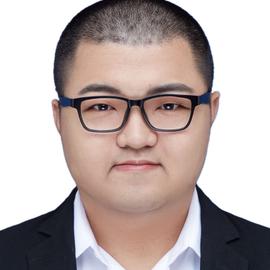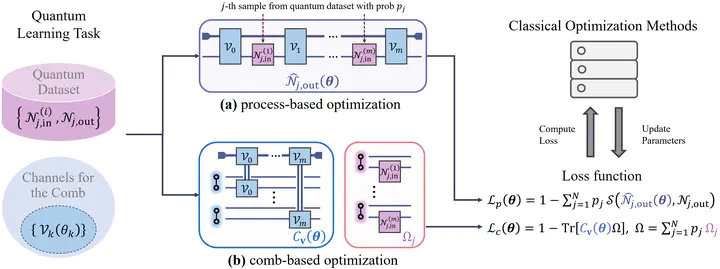Abstract
Quantum combs play a vital role in characterizing and transforming quantum processes, with wide-ranging applications in quantum information processing. However, obtaining the explicit quantum circuit for the desired quantum comb remains a challenging problem. We propose PQComb, a novel framework that employs parameterized quantum circuits (PQCs) or quantum neural networks to harness the full potential of quantum combs for diverse quantum process transformation tasks. This method is well-suited for near-term quantum devices and can be applied to various tasks in quantum machine learning. As a notable application, we present two streamlined protocols for the time-reversal simulation of unknown qubit unitary evolutions, reducing the ancilla qubit overhead from six to three compared to the previous best-known method. We also extend PQComb to solve the problems of qutrit unitary transformation and channel discrimination. Furthermore, we demonstrate the hardware efficiency and robustness of our qubit unitary inversion protocol under realistic noise simulations of IBM-Q superconducting quantum hardware, yielding a significant improvement in average similarity over the previous protocol under practical regimes. PQComb’s versatility and potential for broader applications in quantum machine learning pave the way for more efficient and practical solutions to complex quantum tasks.
Publication
npj Quantum Information

Research Associate
I obtained my BS in Fundamental Science in Physics and Mathematics from Tsinghua University. I obtained my PhD degree in Computer Science from the University of Hong Kong. My research interests include quantum information theory, quantum supermaps and quantum machine learning.

PhD Student (2023)
I obtained my BMath in AMath, CO & joint PMath from the University of Waterloo. My research interests include quantum information theory and quantum machine learning.

Research Associate
I obtained my BS in Mathematics and Applied Mathematics from University of Science and Technology of China. I obtained my PhD degree in Applied Mathematics from University of Chinese Academy of Sciences under the supervision of Prof. Xiao-Shan Gao. My research interests include quantum computing, symbolic computation and cryptanalysis.

Research Assistant
I obtained my B.E. in Information Engineering from South China University of Technology. My research interests include quantum information theory and quantum computation.

Associate Professor
Prof. Xin Wang founded the QuAIR lab at HKUST(Guangzhou) in June 2023. His research primarily focuses on better understanding the limits of information processing with quantum systems and the power of quantum artificial intelligence. Prior to establishing the QuAIR lab, Prof. Wang was a Staff Researcher at the Institute for Quantum Computing at Baidu Research, where he concentrated on quantum computing research and the development of the Baidu Quantum Platform. Notably, he spearheaded the development of Paddle Quantum, a Python library designed for quantum machine learning. From 2018 to 2019, Prof. Wang held the position of Hartree Postdoctoral Fellow at the Joint Center for Quantum Information and Computer Science (QuICS) at the University of Maryland, College Park. He earned his doctorate in quantum information from the University of Technology Sydney in 2018, under the guidance of Prof. Runyao Duan and Prof. Andreas Winter. In 2014, Prof. Wang obtained his B.S. in mathematics (with Wu Yuzhang Honor) from Sichuan University.
 Training formalism for the PQComb framework.
Training formalism for the PQComb framework.